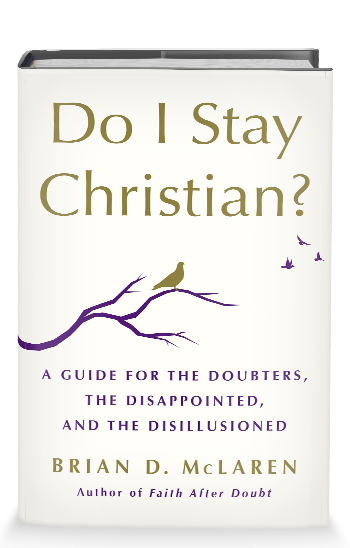I like to think of myself as an innovative, avant-garde and cutting-edge minister, so I am always on the lookout for books that will make me look more radical than I actually am.
Brian McLaren titled his latest book to attract ministers like me: Do I Stay Christian? A Guide for the Doubters, the Disappointed and the Disillusioned. McLaren set a trap, and I fell for it. Without having read a page, I invited some thoughtful church members to read the book and talk about it at the parsonage.
I should have paid more attention to the title. I should have taken it more seriously. The book is not for everybody. Do I Stay Christian? begins with 10 chapters filled with strong reasons to stop being Christian.
- Christianity has a horrifying history of antisemitism, which continues today.
- Christianity has a terrifying habit of destroying Christians who have different ideas.
- Christianity has supported slavery, white supremacy and Christian nationalism.
- Christianity is guilty of toxic institutionalism.
- Christianity has operated with a disgusting level of greed.
- Christianity has wholeheartedly embraced patriarchy.
- Christianity has defined itself by an unforgiving theology that Jesus wouldn’t recognize.
- Christianity has not transformed lives the way it promises to. (Some of the meanest people are Christians.)
- Christianity has an anti-intellectual streak that rejects science and encourages awful politics. (Christians elected Marjorie Taylor Greene.)
- Christianity has an AARP-centered demographic that trends toward old, discredited views.
 For 70 pages, McLaren lays out solid reasons that being a Christian is embarrassing: “I could not stay a Christian if my only option was the old way, the old way of white Christianity, the old way of patriarchal Christianity, the old way of Theo-Capitalistic Christianity, the old way of violent, exclusive and authoritarian Christianity with its suppressed but real history of cruelty.”
For 70 pages, McLaren lays out solid reasons that being a Christian is embarrassing: “I could not stay a Christian if my only option was the old way, the old way of white Christianity, the old way of patriarchal Christianity, the old way of Theo-Capitalistic Christianity, the old way of violent, exclusive and authoritarian Christianity with its suppressed but real history of cruelty.”
I understand what he is saying, but I am also friends with old Christians, white Christians and Christians who like capitalism. A third of the way through the book, I was thinking, “As a minister at a Christian church, encouraging cherished church members to read this may not be my best idea. Christians can be disappointing, but should I suggest that’s a reason to quit the team?”
McLaren, who was a pastor for 24 years, makes such a strong case for sleeping in on Sundays that I imagine my dear friends reading the first 10 chapters and deciding they are done with Christianity. How will I respond when a bright church member says: “I didn’t realize how much damage Christianity does. I’m out.”
The second section of Do I Stay Christian? is 10 chapters — 72 pages — of reasons we should remain Christian.
- Leaving Christianity hurts dedicated people who are trying to make it better.
- We do not have to choose between leaving defiantly and staying compliantly. We can stay defiantly.
- There is no perfect place to go.
- We can be more effective pushing for a better faith inside the church.
- We should stay because of Jesus.
- Leaving is about feeling superior, and we are in this together.
- We can understand Christianity as a way of life.
- We can change Christianity for the better.
- We can grow more enlightened in our understanding of God.
- We can see with a broader perspective.
A delightful group showed up for bacon, eggs and a challenging conversation. Everyone who was there understands Christianity is in sad shape in a variety of ways, but we also long for purpose and meaning. That is why we choose to be part of the church and read books that make us think.
Despite all the lousiness of Christian history, Christianity remains a path to becoming more fully human, “passionately eager to embody a way of being human that is pro-justice, pro-kindness and pro-humility.”
By the time he gets to the last third of the book, McLaren sounds like a preacher again. He invites his readers “to become the most just, kind and humble version of ourselves that we possibly can” as we “practice a faith that expresses itself in love” so that we might “lean with others into a new kind of humanity.”
Like most Christians, the good people in my congregation have questions about our faith but want to work for good. We want to keep listening for Jesus’ invitation to the perpetual rethinking of repentance and the cultivation of the beginner’s mind. We want to keep following Jesus’ example of nondiscriminatory love and courageous truth-telling. We want to keep living with awe, wonder and curiosity — even when it means asking hard questions.
Brett Younger serves as senior minister at Plymouth Church in Brooklyn, N.Y.
Related articles:
Being Christian in an antediluvian age | Opinion by Stephen Shoemaker
These Christians are leaving behind the church, but not their faith | Analysis by Mallory Challis


